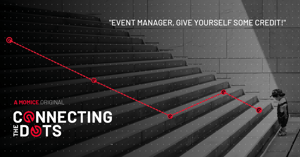Time and time again, event professionals give their all to create a great event. Yet, they are often not involved enough in the success factors and the results of the event. Both the event manager and the organisation can be held accountable for this.
Serious business
Events are serious business. In times of digitalisation and online communication, face-to-face meetings become increasingly important. Meeting the target audience in person, means enriching and strengthening the relationship. This is an important addition to quick online interactions. More and more organisations allocate substantial budgets to the organisation of qualitative and content-related events, while paying more and more attention to personalisation based on the interests of the target group. On average, companies organise 24 events per year. The budget per event varies vastly, ranging from a few thousand euros to more than €100.000 euros. On average, this comes down to €8.000 per event. Quite a bit of money!
Frustrations of event managers
The work of the event manager is of great importance for many organisations. But when does an event manager consider an event successful? A short survey among our clients shows that event managers are mainly concerned with location, catering and a smooth on-site registration. The bigger picture - or the impact events have on the overall marketing strategy - is less often considered by event managers. In other words, chances are that the departments Marketing and Events have different definitions of a ‘successful event’.
The top 10 frustrations of event managers? Read it in this blog!
This is what goes wrong
Too often, event professionals are still considered operators. The most important quality of many event managers is their go-getter mentality. Whatever your request, they go and fix it. However, the same time this is their biggest pitfall. Many event managers are constantly in ‘execution mode’ and are mainly guided by the wishes and agendas of others. On top of that, the planning of an event is often very tight - or it is a last minute decision to organise an event. Because of that, event professionals rarely get, have or take the time to zoom out and take a look at the bigger picture: the event objective and the indicators of success. Many of the event managers indicate that, often, they don’t even know the goals or get to know them too late. But how will you know as an event professional whether you ‘did a great job’? That is actually the crux. Unless you start with clear objectives and have the right tools to measure them, you will never know.
How to turn this around
Step one: event managers, give yourself some credit! Your role is crucial for meeting the marketing and sales objectives of the company. The profession of the event manager is complex, hectic and multidimensional. In the run-up to an event, they will have a lot on their plate. Obtaining and invitee lists, keeping track of registrations, managing supplier contact and responding to last-minute changes. Besides, many event professionals don’t have access to the right tools to work quickly and efficiently. Still too often, there is no software available for automating the registration process or sending out the invitations. This making the invitation process a time-consuming task and results in disappointing attendance rates.
Results, trends and personalisation
After the event, little attention is spent to measuring the results and the evaluation of the event. Calculating the event ROI is still (too) often being deemed complicated or even impossible. By determining predefined measurable objectives and measuring the different factors of success, the event can be evaluated. Also, it enables an event manager to improve next editions and align them with the needs of the client. Structurally measuring results and comparing them over time, makes it possible to discover trends. The information about the target audience, obtained from events, can be a real treasure. You’ll increasingly learn about your client, which improves the personalisation of the message in the future.

